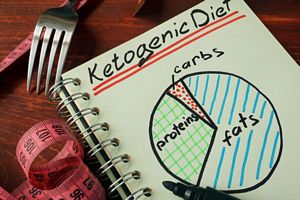
Control Your Insulin to Control Your Weight
Weight loss is not as simple as it is sometimes made out to be.
The Calorie Counters

On the one hand you have the “Calorie Counting Crowd” who are absolutely certain that weight loss is as SIMPLE as taking in less calories than you burn, regardless of what kinds of foods you eat. They become really annoyed at the suggestion that there may be more to it, and, in an authoritative tone repeat, “Weight loss = Calories In – Calories Out,” while looking flabbergasted, as if the people who question them have unbelievably thick skulls. Overall calorie intake does play a role in determining one’s weight (a big one!), but I believe that there are OTHER factors that can strongly influence the weight loss equation as well.
The Twinkie Diet
In 2010 a university professor made headlines and his story went viral. Mark Haub of Kansas State University decided to try out his now famous Twinkie Diet. He basically ate Twinkies and chips (making sure to consume less calories than he burned in a day) and lost 27 lbs in 2 months, proving to his students that it’s the amount of calories that count when trying to lose weight.
As you can imagine there are a few problems with this EXPERIMENT. First, nobody could eat junk food all day every day and live very long (*Note; he kind of cheated by also consuming a protein shake and multivitamin supplement). But even if you decided to eat chicken breast, rice and broccoli, or healthier foods, it would still be difficult to maintain that over the long haul with willpower alone.
A Pound of Flesh
The next problem has to do with which pounds are being lost? It’s pretty easy to run a weight loss experiment at the start of the journey, when one is very overweight, and see big losses on the scale month after month. Almost any diet can attain that success. But what about the pounds of extra body fat that people want to lose in the latter stages? How come it becomes much harder? And why are the last 10 pounds so stubborn? If it was as simple as eating less than you take in they should come off just as easily as the first 10, but they don’t.
The Calorie Counters will argue that the reason weight loss rates slow over time is because people’s metabolism slows as their weight decreases. This has some truth to it but it doesn’t fully explain the issue. If that argument about metabolism slowing as you get lighter was the case then:
– Why is it that some people reduce their calories so low, around 1500 for grown adults (much less than the recommended 2700 for men and 2200 for women) and still not lose weight? Their metabolism can’t have slowed to that of a toddler’s.
– Why is it that some skinny people eat whatever the hell they want, whenever the hell they want and never gain weight? If you say it’s because they have a “fast metabolism”, how come they don’t lose tons of weight when they eat “normal” amounts of food? They don’t prepare feasts everyday.
– If people ate less calories than they burned each day, even by a mere 100 calories, shouldn’t they waste away to nothing over a certain period of time? That doesn’t happen obviously. Just read any account of a Holocaust survivor who only ate a small bowl of broth daily while enduring 12 hours of physical work.
Overall Calories Play a HUGE role but …
The conclusion drawn is that calorie counting plays a major role in weight loss/gain, but not a complete one which makes it a big FACTOR in the overall weight loss equation, not the complete solution to it.
The Low Carb Believers

On the other hand you have the low carb believers who subscribe to diets like the Atkins, Ketogenic and Paleo diets. They don’t care about calories at all and eat whatever they want as long as the total carb intake for the day is VERY minimal. These diets put the body into a state of “ketosis” which simply means that the body burns fat instead of carbohydrate for energy. This group often states that being in ketosis makes your body into a “Fat Burning Machine” but can never tell you exactly why.
Why a machine? They make it sound like eating this way converts your body from a normal one to this adipose-hungry beast that can’t get enough and is ravenous for it’s stores of body fat.
Why does the body burn more than what you take in? Shouldn’t it just burn the fat you eat instead of the fat you eat AND the fat stored in your body?
And yet people do lose weight on these low carb diets, even if they eat more calories than they take in. There are whole communities online of people trying out these diets and succeeding fantastically.
They claim it’s by controlling insulin levels.
Insulin
There is a TON of debate out there on what insulin’s role is as it pertains to weight and most of it is very complicated.
To simplify, this is how it goes:
Insulin —> Takes glucose (sugar, carbs) from your blood and puts it in your cells (muscles, organs etc.)
.
Eating carbs —> Releases insulin in your bloodstream.
.
Eating too many carbs —> Elevates insulin for long periods and leads to insulin resistance.
.
Insulin Resistance —> Your cells (organs, brain, muscles) are getting too much insulin and start SAYING NO to it, and won’t let it do it’s job —> too much sugar floating around your bloodstream —> more insulin released to deal with the excess floating sugar —> finally floating sugar stored as fat since it can’t stay in the bloodstream and so body goes into fat storing mode.
.
Fat Storing Mode —> Body is constantly in that state, converting the excess sugar to fat, and therefore keeps STORING fat instead of BURNING fat = weight gain.
And then the cycle continues.

Keeping Insulin Low
So the key for “Low Carbers” or anybody really is to keep insulin low to avoid this fat storing mode, and the way they do that is to:
1- Eat foods that don’t release insulin, or don’t release too much of it. They eat meat and veggies and fruit, grains and starches in moderation and stay away from sugars altogether for reasons just stated above in the insulin/glucose dynamic example.
2- Fasting: Well obviously if you are taking in NO food then your insulin levels will be low to nothing. But the real benefit of fasting, as it pertains to weight loss is it’s effect of lowering insulin resistance. Another way of saying that, is it improved your insulin sensitivity which means you’ll need to release less of it to do it’s job. And, as stated above, insulin resistance starts your body going down a path to weight gain and diabetes.
The amount of time needed to fast to gain this benefit can go from skipping one meal (so about 18 hours) to a couple of days. People refer to these times as being in the “fasted state.” The more often one spends time in the fasted state, the more one’s insulin resistance drops and the more fat is broken down.
There are other benefits being discovered about fasting as it is becoming a trend. Benefits like; improving metabolism, reversing or slowing aging, tissue healing, increased energy etc… I will write more on fasting in an upcoming blog post.
3- Exercise: It not only helps you lose weight by burning calories, but it also lowers your insulin resistance which as we’ve just seen, helps you lose weight ON TOP OF what you just burned at the gym.
Both aerobic and resistance training lower insulin resistance with the combination of the two being optimal. A diabetes management article cited that after 4-6 weeks of resistance training, subjects improved their insulin sensitivity by almost 50%. They also measured the effect of resistance training on men who were just diagnosed with diabetes and found that after 4 months they lost fat, gained muscle tone, improved their insulin sensitivity and INCREASED THEIR CALORIE INTAKE by 15%!!
There are so many layers of benefits that exercise has to offer that it would be a good idea to include it in some way in your life on a regular basis.
Summing It All Up
Controlling insulin levels seems to be a really important factor in weight loss, finding itself involved and playing a key role in all of the traditional ways that people try to lose weight; eating less, eating different types of food and exercise.
Lose weight and improve your health at the same time by minding your insulin.
…

THE EATING LOVE GUIDE (FREE)
The Eating Love Guide has helped many people regain control of their eating patterns, resulting not only in weight loss but also better health and improved self-esteem. To read it online, click here.

SUBMIT A POST!
To post your cheat meal, click here. To share your tips, wisdom and/or emotional journey, click here.


